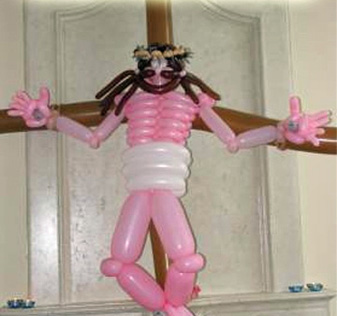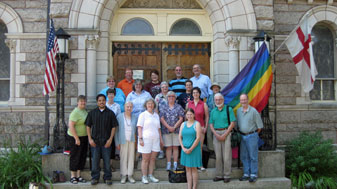This weekend marks the tenth anniversary of the September 11 terrorist attacks on the World Trade Center and the Pentagon.
Back then, our family was still living on the Lower East Side of Manhattan. At 9 AM, I came upstairs to my office at a publishing company in the West 30s to find everyone peering out the window at smoke billowing from the WTC. We could only see the top floors in the distance so we were not sure what had happened. We saw the flash that was the second plane hitting, but only found out later what had caused it. After that, the grey cloud of smoke and ash was all we could see. Shortly thereafter we learned from the radio that the towers had collapsed and another plane hit the Pentagon. It was then that I became really scared: this was not an accident, it was an attack, and anything could happen now. I don’t remember how we evacuated from the 21st floor, but I assume we must have taken the stairs. Fortunately my husband worked in midtown too and I could email him to come meet me, since the phones were not working.
We walked about three miles downtown to our apartment, part of a stunned crowd. The funereal silence and slowness of these typically high-adrenalin New Yorkers really brought home to us that our world had changed. (I am so proud of the residents of my birth city for not panicking and responding with such courage.) My moms lived across the street from us so we went up to their place to let them know we were all right. One of them was there and the other was making her way downtown from West 96th St., driving her co-workers home, as far as the emergency personnel would allow cars to go. Like everyone that day, we obsessively watched the televised footage of the disaster, hoping for information that would make sense of it all, although it was clear that only speculation and tragedy were on offer.
We were spared the pain that thousands of our fellow New Yorkers endured, in that we did not know anyone who was in those buildings. Our upstairs neighbor lost his brother, Robert Foti, a firefighter. We went to his funeral a few weeks later. Rest in peace, Robert. I will never forget his mother’s words when we paid her a condolence call. “They’ll never find their bodies,” she said, wiping her hand along the table. “See this dust? We’re breathing them in right now.”
What I remember most from those early days was the fear of what might be demanded of us. What sacrifices would we have to make? Would it be like World War II, when the homefront was part of the battle? I was worried that Adam would feel a sense of duty to enlist. Though I am the least bureaucratic person in the world and had just escaped from my legal career, I sent away for a pamphlet about joining the Judge Advocate General’s Corps.
Our preoccupations of the week before were tinged with tragic irony. Walking home from dinner, in a rush to watch the U.S. Open, Adam and I got sidetracked into an argument about his wish for children. Newly independent of my parents, I was afraid I wouldn’t get to experience life and make progress in my writing career before being submerged in someone else’s needs. After 9/11, I felt keenly the truth that “no one knows the day nor the hour”. Plans are uncertain; family matters most in a crisis. (Double irony since we still haven’t been able to make this happen…)
There was something beautiful about the mindfulness and tenderness with which New Yorkers went about their business in the following weeks. On a crowded midtown bus at rush hour, truly one of the more unpleasant aspects of New York life, I noticed that people gave way to one another instead of jostling and taking offense. We were suddenly grateful that each person next to us was still alive.
And simultaneously there was the crassness of the “Fight Back New York: Go Shopping!” campaign, the alarming speed with which the sidewalk vendors cranked out death-to-Osama T-shirts and flag-festooned junk. The mutual contempt of the pro- and anti-war camps, everyone desperate for a simple narrative, as if death always came to people with a reason and a forewarning, visible if we looked hard enough.
It was supposed to be the end of irony. Even if that had been true, I don’t think it would be a good idea. We need all possible interpretive tools to make our way in a world where 9/11’s happen. What it was, instead, was a collective moment of appreciation that life is precious and mysterious, and that no one is really a stranger. That consciousness was too painful, though, and too unprofitable, to keep up for long. “Go, go, go, said the bird; humankind/Cannot bear very much reality.”
But for that little while, we cried at baseball games, we wore our flag lapel pins and bootleg NYPD and FDNY caps, we prayed over the names in the newspaper and asked forgiveness for being unable to read one more obituary, and we wrote poetry about crashing planes and falling towers and heroes.
Adam and I had just started Winning Writers that summer, and we were putting together the rules for our first annual contest. Distressed by the simplistic verses being written by both the blame-America liberals and the kill-the-Muslims conservatives, we decided that our contest should solicit high-quality and nuanced poetry about war. (2011 will be this topic’s tenth and final year, to be replaced by the Sports Poetry Contest.)
These poems from Israeli author Atar Hadari, honorable mention winner in our 2003 contest, best express how New York felt to me in the aftermath. The “two lights” are the memorial Tribute in Light that represented the lost towers with spotlight beams.
Read more 9/11 reminiscences at the WNET-Channel 13 public television website.
****
SUMMER RAIN
by Atar Hadari
This is the season people die here,
she said, Death comes for them now.
Sometime between the end of winter
and the rains, the rains of summer.
And the funerals followed that summer
like social engagements, a ball, then another ball
one by one, like debutantes
uncles and cousins were presented to the great hall
and bowed and went up to tender
their family credentials to the monarch
who smiled and opened the great doors
and threw their engraved invitations onto the ice
and dancing they threw their grey cufflinks
across each others’ shoulders, they crossed the floor
and circles on circles of Horas
filled the sky silently with clouds, that chilled the flowers.
And funeral trains got much shorter
and people chose to which they went
and into the earth the flowers
went and no one remembered their names
only that they died that summer
when rains came late and the streets emptied
and flags flying on car roof tops
waved like women welcoming the army
into a small, abandoned city.
TWO LIGHTS
by Atar Hadari
Two lights were fixed over the town
high up, higher than any star had business being
and yet they shone, not like helicopter beams,
like flames, like something burning and not being consumed.
I stepped two steps toward the fence
to see, to try to see, the fire –
they stayed two gold balls in the sky
and I trod on some stones and smelled dog piles.
Whenever I tried to hear roar
of propellers’ wings, the milk trucks
would careen by in their floats
and commuters late home whizzed by in droves
like ice cream vendors.
Eventually one went out
then the other and suddenly
way above them both
another lit, preternaturally still,
an emptying cinema’s white bulb.
A jogger came out of the dark
my side of the fence
I waved, “Do you know what that is?”
“It’s light to find the terrorists,” he said
and ran and I walked away
looking thru at darkness
and left one bulb in the middle
of the empty cinema
like traces of a flame
after you’ve closed your hand
and clenched your lids
and walked out of the shot
and lights still burn in that sky
and I translate the word of God
out of Hebrew. And wanderers in that dark
mistake those lights for guides through the ruins.

